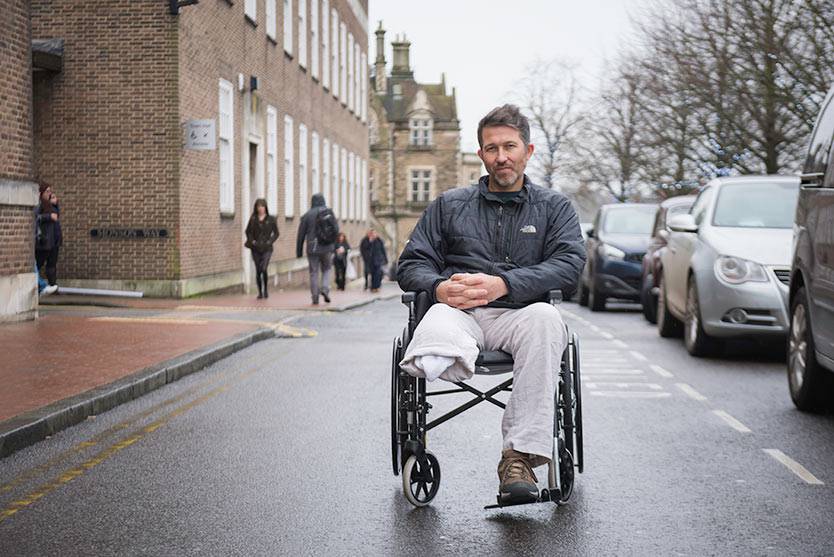A traumatised father of three has been denied a £120,000 insurance payment after losing a leg in a motorcycle accident. Insurers claimed his injuries were ‘not critical enough’ and that he needed to lose ‘two or more limbs’ to qualify for a payment.
Hein Pretorius suffered two broken legs below the knee, a broken femur and broken pelvis after he was struck by an oncoming vehicle during his commute to work.
The complexity of his injuries following the collision on the Bayham Road in August meant he had to be airlifted to a London hospital, where his right leg was amputated below the knee.
But despite paying almost £25,000 to cover life and critical insurance since he took out his first policy in 1998, Mr Pretorius has not seen a penny of the £120,000 he thought he would be entitled to from his two insurers.
Since the accident, Mr Pretorius said he has been fighting both Legal & General and insurance firm Bright Grey to secure a payout from his life assurance policies as the liability does not fall under a motor insurer.
And now Mr Pretorius is concerned his family will lose their house.
He said: “We are worried about it. I was previously on a relatively decent salary, but despite the help of some benefits related to my disability, my monthly income has been dramatically reduced.
“Basically, I need to get myself physically fit as soon as possible to allow me to get back to work and earn. If I don’t, we may lose our house.”
The 44-year-old, who lives with his family in Madeira Park, Tunbridge Wells, added: “The insurance companies argue it is a black and white case of me signing a contract which only covers the loss of two limbs.
“They changed their policies since then to make payouts for the loss of one limb, but they won’t pay out to me as my contracts were signed in 1998 and 2007.
“It just seems like they want to wash their hands of the issue. They blame the broker for not telling me to update my policy.”
Mr Pretorius argues the main text of the contracts were ambiguous when they claimed a payout would be made upon the ‘loss of limbs’, with a clearer definition, stating two or more, tucked away in the small print.
The accident occurred during Mr Pretorius’s morning commute to work as the regional operations manager at Hush Heath Hospitality in Goudhurst, a job which paid £50,000 a year.
He is now forced to rely on £88 a week in statutory sick pay, alongside benefits, as he was only at the company for half a year before the accident and has remained in hospital ever since.
This has put a strain on the family finances as his wife, Ellen, only works on an irregular basis and her income is insufficient to cover the family costs.
The majority of time is spent look-ing after their three children, 11-year-old Louis and seven-year-old twins Mabel and Theo, a job made far harder since the accident.
Mr Pretorius said: “We are in arrears with our mortgage, which has destroyed my credit rating. We have sought help from the debt charity Step Change, who have secured more manageable token payments for us.”
He admitted some people may criticise him for not getting income protection as part of his insurance and said one of his reasons for highlighting his plight was to raise awareness.
He added: “I do not want pity. I am resilient and optimistic. But I do not want other people to be in the same situation I am now in.”
A spokesman for Legal & General confirmed the insurer’s terms had changed in 2009 and said they were ‘very sorry’ to hear Mr Pretorius is ‘unhappy with our decision’ regarding the claim.
But she added the firm is ‘bound by the terms and conditions of the critical illness policy contract which he purchased in 1999,’ claiming this prevented them from paying out for the loss of one limb.
She said the company have assessed Mr Pretorius’s claim under another clause of the policy which covers ‘total and permanent disability’, however: “It is too early in Mr Pretorius’s treatments and recovery to confirm if the policy definition of Permanent and Total Disability has been met.”
His claim would be reviewed again in due course, she added.
A spokesperson for Bright Grey also highlighted the legal obligation to stick to the terms and conditions of the policy.
He said Mr Pretorius was made aware a payout would only be made upon suffering a ‘total permanent disability’ defined as: “the permanent physical severance of two or more limbs from above the wrist or ankle joint.”
But he added: “It is too early in Mr Pretorius’s recovery to predict if a claim would be payable under these sections of his insurance policy, but we will review it after 26 weeks – which was the time chosen by Mr Pretorius when he took out the policy.
“We are unable to retrospectively change our terms and conditions as it could benefit some customers and disadvantage others.”
The Financial Ombudsman ruled in favour of Legal & General in October, claiming it had dealt with Mr Pretorius’s case ‘fairly’, and so no action could be taken.
It found the wording ‘loss of limbs’ was explained in the terms and conditions as applying to multiple limbs, defined as ‘above the wrist joint or ankle.’
In a letter to Mr Pretorius, the adjudicator said: “I do not underestimate the seriousness of the injury. But as the claim is for the loss of one limb, unfortunately the definition has not been met.”
However, Mr Pretorius has since advised the ombudsman that he does not accept the decision of the adjudicator and will be presenting the case again.








